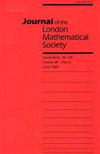The stable category of Gorenstein-projective modules over a monomial algebra
IF 1.2
2区 数学
Q1 MATHEMATICS
Journal of the London Mathematical Society-Second Series
Pub Date : 2025-06-05
DOI:10.1112/jlms.70204
引用次数: 0
Abstract
Let be an arbitrary monomial algebra. We investigate the stable category of graded Gorenstein-projective -modules and the orbit category induced by and the degree shift functor (1). We prove that is triangle equivalent to the bounded derived category of a path algebra of Dynkin type and that is triangle equivalent to the stable module category of a self-injective Nakayama algebra. Both the path algebra and the self-injective Nakayama algebra will be given explicitly. The latter result provides an explicit description of the stable category of (ungraded) Gorenstein-projective -modules.
单项式代数上gorenstein -射影模的稳定范畴
设Λ $\Lambda$是一个任意的单项式代数。研究了梯度gorenstein -投影Λ $\Lambda$ -模块的稳定类Gproj Z Λ $\underline{\operatorname{Gproj}}^{\mathbb {Z}}\Lambda$和轨道类Gproj Z Λ / (1) $\underline{\operatorname{Gproj}}^{\mathbb {Z}}\Lambda /(1)$Λ $\underline{\operatorname{Gproj}}^{\mathbb {Z}}\Lambda$和度移函子(1)。证明了Gproj Z Λ $\underline{\operatorname{Gproj}}^{\mathbb {Z}}\Lambda$与Dynkin a型路径代数的有界派生范畴是三角形等价的$\mathbb {A}$Gproj Z Λ / (1) $\underline{\operatorname{Gproj}}^{\mathbb {Z}}\Lambda /(1)$是一个自内射中山代数的稳定模范畴的三角等价。明确地给出了路径代数和自内射中山代数。后一个结果提供了(未分级)gorenstein -投影Λ $\Lambda$ -模块的稳定范畴的明确描述。
本文章由计算机程序翻译,如有差异,请以英文原文为准。
求助全文
约1分钟内获得全文
求助全文
来源期刊
CiteScore
1.90
自引率
0.00%
发文量
186
审稿时长
6-12 weeks
期刊介绍:
The Journal of the London Mathematical Society has been publishing leading research in a broad range of mathematical subject areas since 1926. The Journal welcomes papers on subjects of general interest that represent a significant advance in mathematical knowledge, as well as submissions that are deemed to stimulate new interest and research activity.

 求助内容:
求助内容: 应助结果提醒方式:
应助结果提醒方式:


